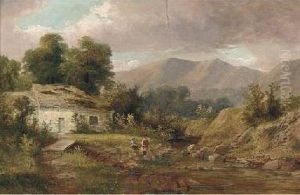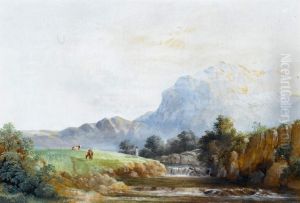W.B. Henley Paintings
William Ernest Henley (1849–1903) was not primarily known as a visual artist but rather as an influential poet, critic, and editor of the late Victorian era in England. His contributions to English literature and the arts were significant, although his name might not be as widely recognized today as some of his contemporaries. Henley was born in Gloucester, England, into a family that faced financial difficulties, which impacted his education and early career choices. Despite these challenges, he developed a passion for literature and the arts, which would guide his professional life.
Henley's personal struggles with health significantly shaped his literary output. At the age of 12, he was diagnosed with tubercular arthritis that eventually led to the amputation of one of his legs below the knee. The long periods of hospitalization influenced his most famous work, 'Invictus,' a poem that reflects his resilience and determination in the face of adversity. The poem's iconic lines, 'I am the master of my fate, I am the captain of my soul,' have inspired countless individuals worldwide.
Throughout his career, Henley was involved in the literary scene as a poet, critic, and editor. He edited several influential journals, including the 'Scots Observer' which later became the 'National Observer.' Through his editorial work, Henley championed the works of emerging writers and poets of the time, such as Rudyard Kipling, Thomas Hardy, and H.G. Wells, thereby significantly influencing the direction of English literature at the turn of the 20th century.
Henley's contributions to literature and the arts extend beyond his poetry and editorial work. His enduring friendship with Robert Louis Stevenson provided inspiration for the character Long John Silver in Stevenson's classic, 'Treasure Island.' Henley's charismatic and robust personality, coupled with his physical challenges, made a lasting impression on Stevenson.
William Ernest Henley died in 1903, but his legacy lives on through his literary contributions and the impact he had on the literary and cultural landscape of his time. His life and work continue to be studied and appreciated for their depth, resilience, and influence on English literature and beyond.






